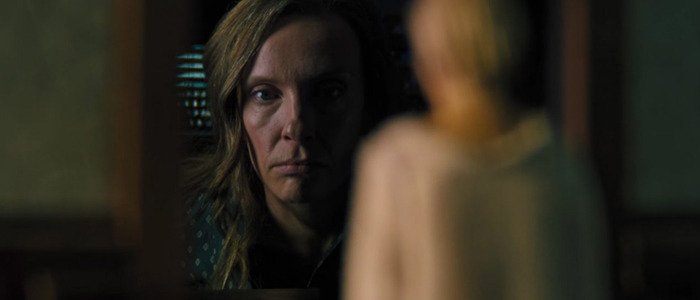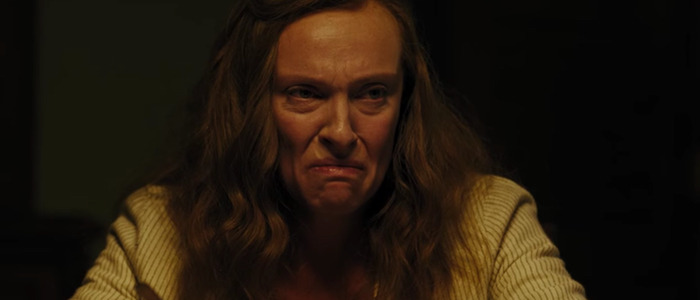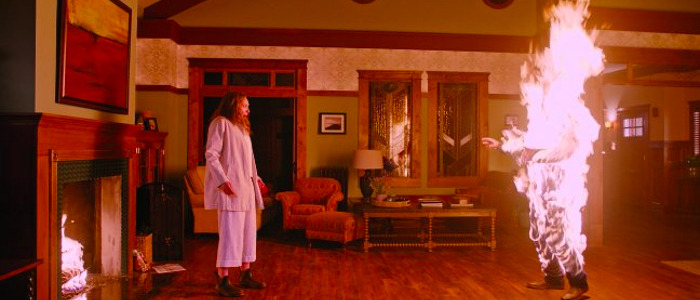'Hereditary' Spoiler Review: Family Is Horror
(In our Spoiler Reviews, we take a deep dive into a new release and get to the heart of what makes it tick...and every story point is up for discussion. In this entry: Ari Aster's Hereditary.)
In its opening days, Hereditary has sailed past tracking expectations and earned A24 its biggest weekend release yet. Ari Aster's indie horror film has been generating conversation since its January Sundance screening, and now that it's on nearly three thousand screens, that conversation has gotten a lot louder.
And there's plenty to talk about when it comes to Hereditary: the soul-chilling performances, the elegant and unusual art design, that balls-out (uhm, literally) ending no one saw coming. But under the polished, cinematic horror of Hereditary is a rougher, truer horror, one that will stay with audiences long past that shocking conclusion.
The real horror of Hereditary is in its relentless, unblinking look at family dysfunction.
The Cycle of Abuse
"My mother was a very secretive and private person."
With this ungenerous portrayal, Toni Collette's Annie opens the eulogy for her mother, Ellen. She goes on to describe the woman who raised her as difficult and stubborn, with "private friends" and "private rituals." We have no reason to doubt the justice of these words (and in fact, by the film's end, we're given plenty of evidence to support them), only their appropriateness at such a time. It's almost as if Annie, who showcases the boldest and barest of truths in her art as a miniaturist, cannot help but speak of her mother with severe precision – even during the eulogy at Ellen's memorial service.
Every time Annie speaks of Ellen, it feels like the words are being compelled out of her in an unstoppable torrent. Later, we see Annie at a grief support group. When the group leader asks if any new members would like to speak, she raises her hand, then lowers it. "Never mind," she mutters, then opens her mouth anyway and spills out the story of her tumultuous relationship with her mom. Ellen was hard and cruel, "never really a mother" to Annie, and they were estranged until a terminal disease forced Ellen back into Annie's life. But Ellen had her own difficulties, Annie concedes. Ellen's husband starved himself to death after suffering from mental illness. Her son hanged himself in his bedroom, leaving a note that blamed Ellen ("of course," Annie shrugs) for "trying to put people inside of him."
Annie rattles off these devastating memories like they're nothing but context for her mother's challenging personality. She says nothing of what the horrifying deaths of her own father and brother have meant for her. We see the shadow of Ellen over Annie in every moment, the words she uses to characterize her mother applying entirely to Annie herself, too: secretive, difficult, stubborn, private. As her family tiptoes around her, Annie locks herself away in her studio, working in fast-paced, fastidious silence as she crafts these intricate miniature scenes of the unhappiest moments of her life.
One such miniature makes for one of the most casually disturbing revelations in Hereditary: that Ellen insisted on breastfeeding Annie's daughter Charlie (Milly Shapiro). "So annoying," Annie sighs of this betrayal, but her art reveals a deeper wound. In the tiny scene, we see Annie in bed with an infant Charlie, with Ellen looming over her, one heavy breast spilling out of her nightgown accusingly. The tableau is bleak and unnerving, as is a miniature in which Ellen stands in the doorway of the bedroom Annie shares with her husband Steve (Gabriel Byrne), legs set staunchly apart, her posture confrontational, the light shining through her gown as she stares down at the couple.
Knowing what we know of Hereditary's ending, everything that Annie says about her mother and everything we see of Ellen in Annie's art fits into a Paimon-shaped puzzle. Her private rituals and friends were in service of this master of hell. The tragic deaths in her family were simply the collateral that comes with a life spent worshiping a vengeful devil. Ellen "got her hooks" into Charlie so she could shape her into a vessel for the demon she wanted to summon. But if we take out the supernatural from the story, we're left with a not-impossible portrait of cruelty and mental illness: Ellen suffered intense anger, depression and self-alienation. She infected those around her until they, too, suffered. Her husband and son escaped only through death. And now Ellen is gone, too, leaving Annie alone to carry this familial burden – and to pass it on into her own family.
I Never Wanted To Be Your Mother
The crux of Hereditary's action centers around a truly shocking scene. Annie's son Peter (Alex Wolff) is stoned and driving Charlie back from a party. She's going into anaphylactic shock due to a nut allergy, and Peter's racing her to a hospital. Charlie holds her head out of the window, trying to breathe, when Peter swerves to miss a deer – and Charlie's head is knocked wholly from her body by a light pole.
It's harrowing, and the film gives us no chance to recover from it. We watch Peter sit in traumatized silence, the full weight of what he's done dragging down every muscle in his face. In full-bodied shock, he drives home and crawls into bed, unable to deal with this disaster, and he lies there, eyes open, until the following morning when he listens in dread as Annie gets in the car, discovers Charlie's headless body, and wails for three days straight. "I just want to die!" she screams as Steve holds her, rocking on the floor with sobs. She screams through Charlie's funeral as Peter stares stonily forward. She screams herself hoarse until we can hardly stand the sound anymore. The worst thing that could happen has happened, and Annie can scarcely be held accountable for anything she says and does after she's hit with this heartbreak.
But here's the thing: Hereditary makes it clear that Annie wasn't much of a mother even before her heart is broken. We never see her treat her children with affection, only with a sort of beleaguered irritation. We learn through the course of the film that she was once "made" to go to a support group like the one she's now willingly attending, probably thanks to substance abuse or maybe anger management, since Annie seems to have no shortage of rage. We learn that, while sleepwalking, she once almost set her children on fire, waking to find them doused in paint thinner and she with a lit match. She rattles this insane story off in the same matter-of-fact way that she talks about her mother: shit happens, Annie seems to be saying, and we all have to deal with it. I had to deal with my mom, and my kids have to deal with me.
Even at the best of times, Annie never seems to want to spend time with her children, alienating herself from them much as Ellen must have alienated herself from Annie. In fact, Charlie's death can be attributed to this neglect – Annie doesn't want to be responsible for her daughter while she's working, so she forces Charlie, against her will, to go to a high school party with Peter. And though no one could doubt the true grief she's suffering after Charlie's gone, the tragedy also serves as a key that unlocks the last and worst of Annie's own maternal cruelty.
The most horrific moments in Hereditary are not visual, although the visual scares in this movie are all-timers: Charlie's head covered in voracious ants and blackened blood on the side of a well-lit highway, Annie crouched in a shadowy corner of the ceiling, waiting to pounce on her unsuspecting son. As effective as these scenes are, they're nothing to the sheer performance of Toni Collette. She makes every calamity in the film feel more real: the grief, the horror, the hatred are all heightened by the way Annie reacts to them.
In a scene as she, Peter and Steve sit around a dinner table days after Charlie's death, she becomes so transformed by rage at her son that we barely recognize her. In a dream sequence, she shouts to Peter, "I never wanted to be your mother," and then claps her hand over her mouth as if she can't control her own spiteful words. She tried to miscarry him, she tells Peter. She did everything she was told not to do in the hopes that it would end her pregnancy. Annie is wracked with emotion in the scene: furious, heartbroken, ashamed, unable to stop herself from breaking her son the way she has been broken.
And, after all, maybe that's why she tried to force a miscarriage all those years ago – because she knew even then that she would have no power over this cycle of abuse and neglect, that she would be to her children the one thing she never wanted to be: her mother.
The Paimon Of It All
So how does devil worship factor into family dysfunction? Aster dresses up abuse, neglect and destructive emotional patterns into a demonic melodrama, making both stories land a little harder thanks to the juxtaposition.
Every story beat in Hereditary can be read two ways. Ellen's hand-embroidered rugs, for instance – on the surface, they work as a clue that reveals to Annie that her new friend Joan (Ann Dowd) was once a friend of Ellen's, but they also work as an elegant shorthand reminding us that even the most picturesque domesticity can hide something sinister beneath. On the one hand, Paimon's secret language is just that: the esoteric communication of a demon. But it also stands as one more secretive barrier keeping Annie from her mother, excluding her from a world she would have once liked to understand. Ellen's headless corpse in the attic is a step toward Paimon's eventual dominion over this family, and it's also a physical representation of an emotional concept: that the specter of Ellen's cruelty and dysfunction continues to loom over her family long after she's supposedly gone.
The best horror is always about more than the boogeyman: it's about the very real fears and anxieties that boogeyman represents. And Hereditary is about much more than Paimon, a demon that, in the end, looks a lot like the latest victim of at least three generations of abuse.



